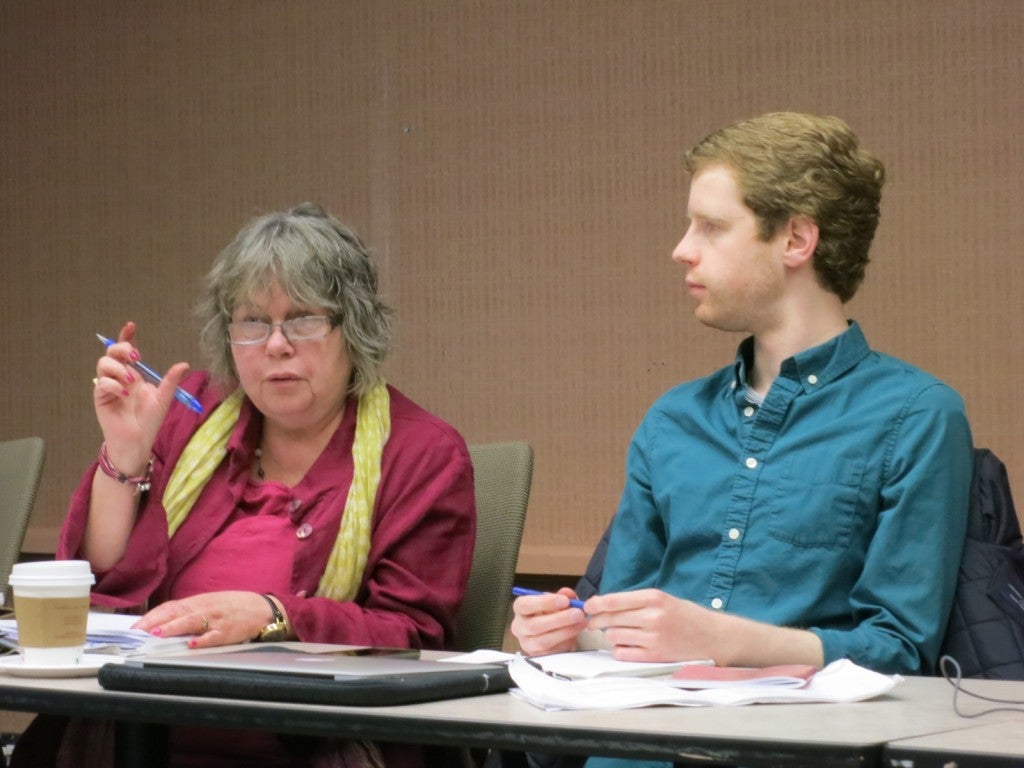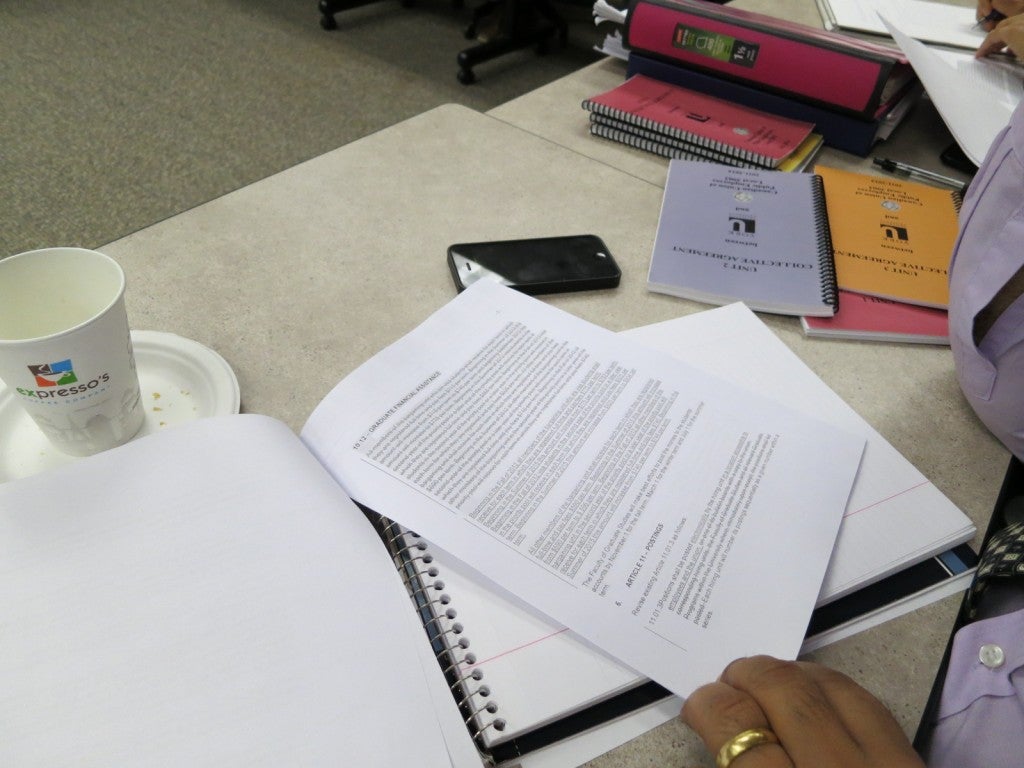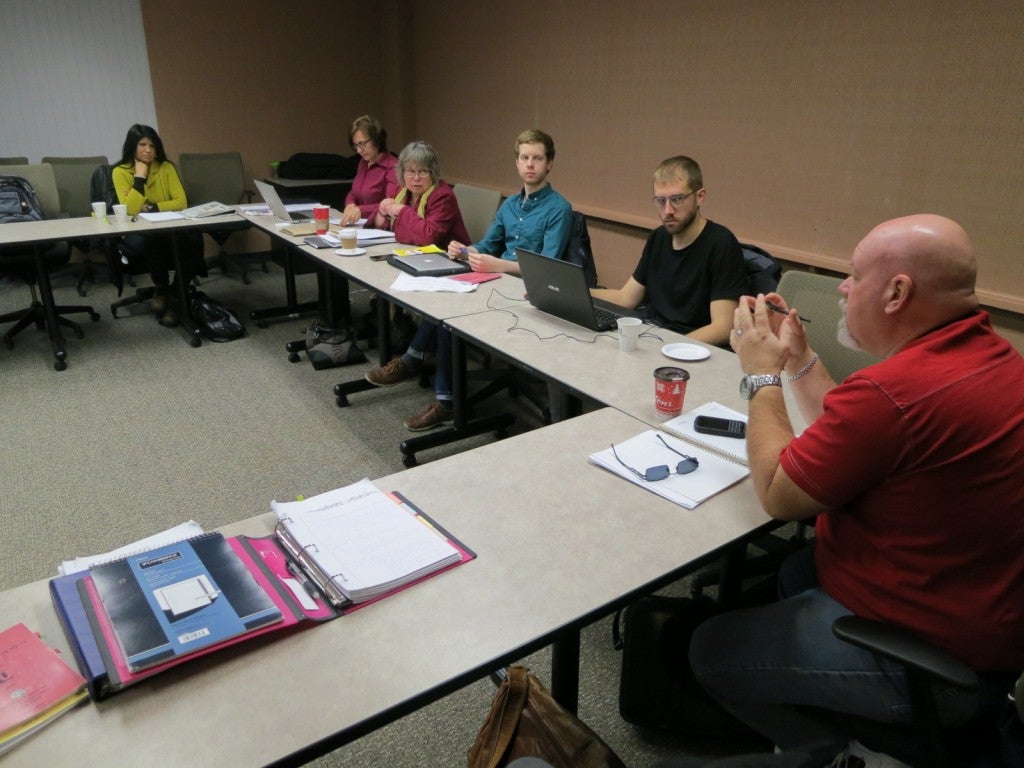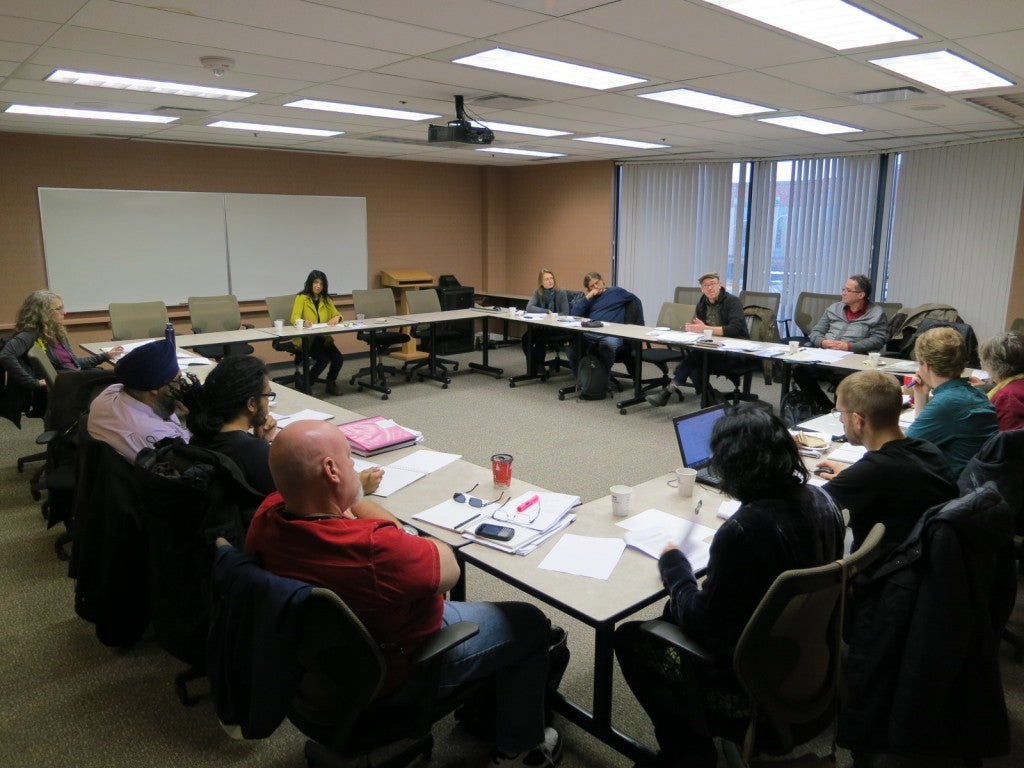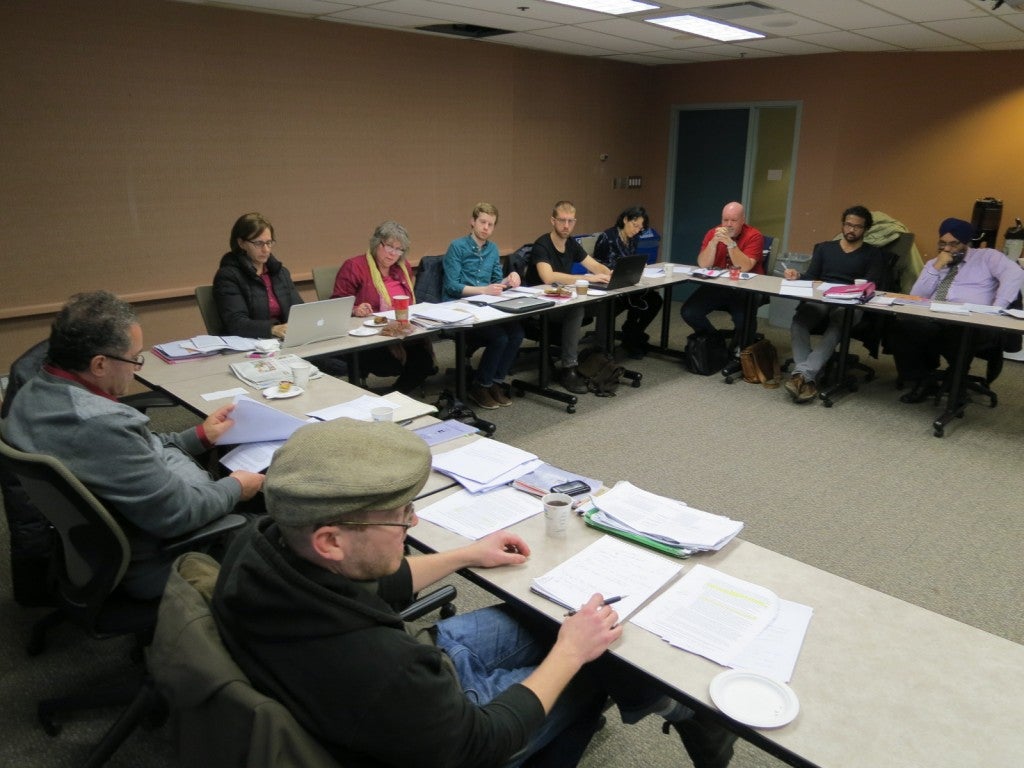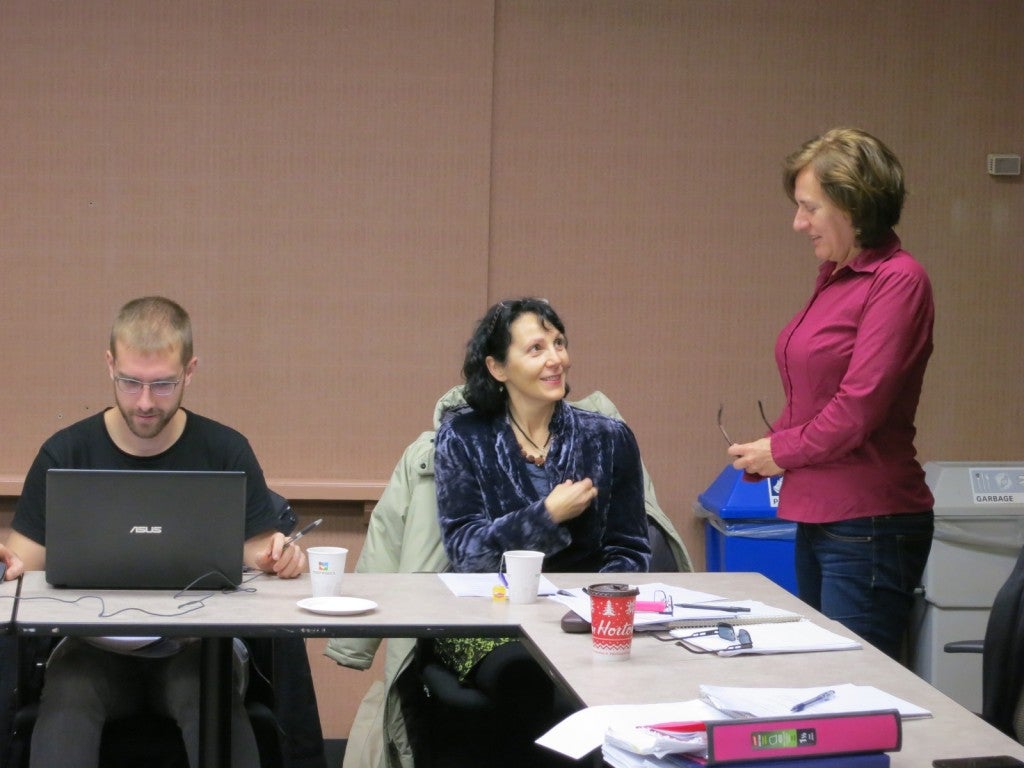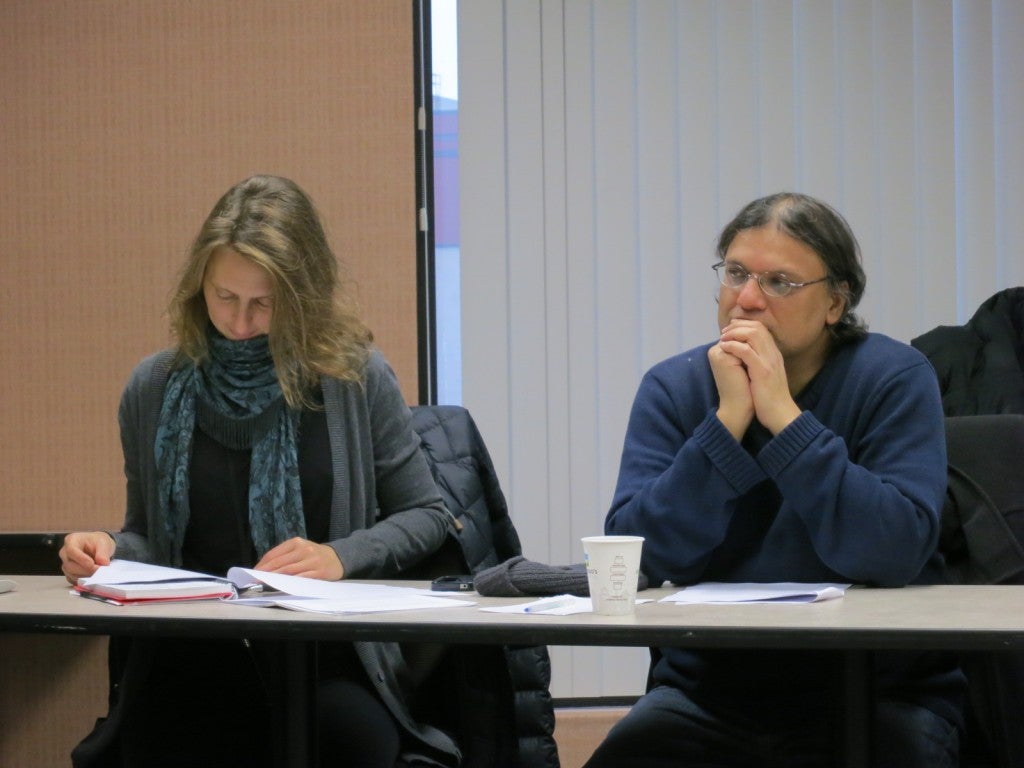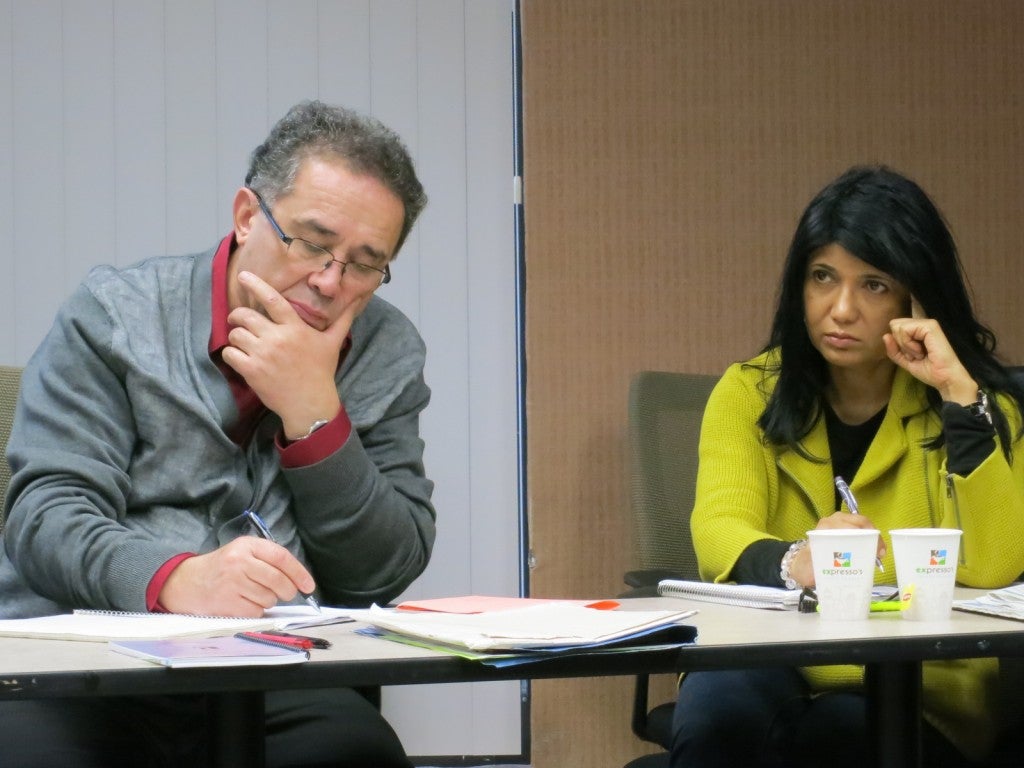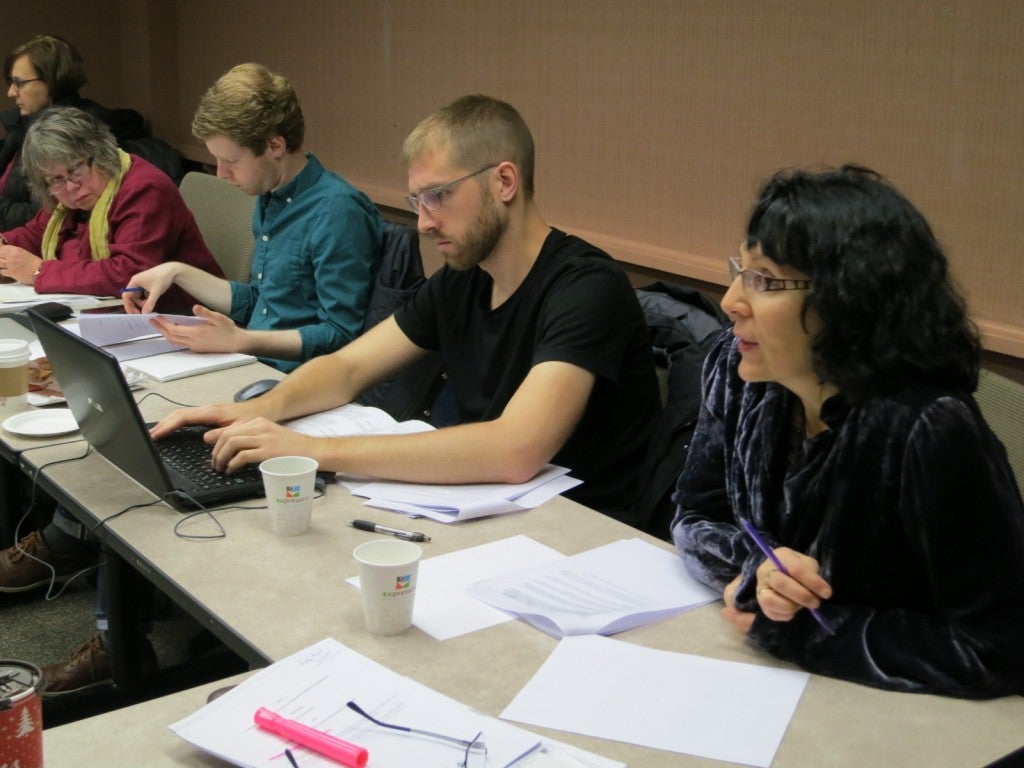
A Unit 2 member responds to the Employer’s counter-proposals on job security during bargaining with the Employer on December 16, 2014.
Items in this update:
- Bargaining news
- Upcoming meetings
- Pictures form the bargaining meeting
Bargaining news
On December 16, the Bargaining Team (BT) engaged in a full-day negotiation session with the Employer, seeing the Employer’s “full proposal package” for the first time – after months of waiting. While the BT had asked for a “comprehensive response” to all of our proposals, the Employer simply added a handful of counters to those its team had already tabled, while choosing not to respond to many of the Union’s proposals.
The Employer has agreed to increases in our Extended Health Benefits, Ways & Means, and the Trans Fund, all of which are important. But the majority of the other proposals are far from addressing CUPE 3903 members’ needs and concerns.
The BT expressed in particular its disappointment with the Employer’s weak counters on Unit 2 job security matters, its lack of a response to the Union’s proposals on Unit 2 qualifications language, and its inadequate offers on Unit 1 and Unit 3 tuition and funding issues.
Units 1 and 3: Tuition & funding
One of the central problems faced by graduate students (Units 1 and 3) is the low funding that they receive: Master’s students generally receive funding in the range of $9,000 per year, and PhD students see funding packages that average about $21,000 per year. The Low Income Cut-off for a single person in a city the size of Toronto is around $24,000. Considering that graduate students are not supposed to work outside the University (according to rules set out by the Faculty of Graduate Studies) and that they have to give a significant portion of their income back to the University in the form of tuition fees, many graduate students end up with very little to live on.
The situation is even worse for international students, who pay significantly higher fees for their graduate studies. Not only has the University increased international tuition fees to around $20,000 – triple the rate for domestic students – it has also eliminated the International Tuition Fees Scholarship (ITFS) that used to help offset the enormous costs of studying as an international graduate student.
The Union’s response to this problem has been to demand that the Employer cover the total costs of tuition for both domestic and international students, and ensure that international students don’t pay more fees than their domestic counterparts.
While the latter may sound far-fetched, consider this: because of the work that international students do, their presence at Canadian universities contributes to the creation of tens of thousands of jobs and helps generate hundreds of millions in government revenue. Moreover, many international students choose to remain in Canada after they graduate.
The Employer’s response has been to offer a 1% per year wage increase and a paltry six-dollar increase to the Graduate Financial Assistance (GFA) rebates given to domestic students, which Units 1 and 3 receive every four months. Clearly, this doesn’t even come close to addressing graduate students’ concerns.
For international students, the University is proposing a laughable GFA increase of $8 to $9 over the life of the collective agreement, a few months after increasing the effective cost of their education by more than $10,000.
The Employer has also failed to recognize that the GFA rebate should come in addition to a graduate student’s funding package. In some departments, the GFA is included as part of the minimum level of funding, which shouldn’t be happening: CUPE 3903 maintains that it should be counted on top of that minimum, and is demanding that the Employer recognize this in our new agreements.
Unit 2: Job security & workload
The Employer has also proposed raising the wage rates of contract faculty by 1% in each year of the new agreement. It’s worth noting that CUPE 3903 didn’t put an explicit wage proposal in front of the Employer because we first want to address our central concern: ensuring that contract faculty not only have their work properly recognized, but also have it stabilized. As contract workers, we’re made to re-apply for our own jobs every 12 months – even when many of us have worked here consistently for decades – and there are no guarantees about the amount of work we’ll get, or what that work will be.
This is true for those of us at all levels of seniority, both high and low. Consequently, CUPE 3903 has proposed an integrated job-security strategy that would see the stabilization of the employment of all contract faculty. At the core of this proposal is what we are calling “Continuing Sessional Appointments” – after teaching at least one course directorship (or equivalent) per year for three years, contract faculty would be guaranteed their average amount of work thereafter.
We are also proposing an expansion of our Long-Service Teaching Appointment (LSTA) program, so that members would qualify for a multi-year LSTA contract after teaching a minimum of 2.5 courses or course equivalencies over five years.
For members who are able to meet the requirements for probationary tenure-stream appointments – to Professorial or Alternate Teaching Stream positions within the York University Faculty Association (YUFA) – we are proposing “automatic” conversions that would see two to five Unit 2 members transferred each year into tenurable full-time tenure-track positions.
The Employer’s counters on these job security proposals came nowhere near what we are proposing. Its team has countered that, only after eight years of teaching, when at least 2.5 course directorships were taught per year in the previous three years, would a contract be guaranteed. And they are proposing this be based on incumbency: the Employer’s counter-proposal attempts to get around seniority by simply appointing people to the classes they’ve recently taught. Their proposal also contains loopholes around when job postings are made: if the Employer simply doesn’t put up a posting in time, people are just out of luck.
Similarly, the Employer is suggesting that we give up three conversion appointments (i.e. appointments to tenure-track positions), and has offered only three additional LSTAs, while we are asking that all members with a minimum of five years teaching at York (at an intensity of an average 2.5 full-course equivalents over the three previous years) automatically receive an LSTA. This would stabilize close to 250 Unit 2 members in the work that they are already doing.
The University of Western Faculty Association (UWOFA) already has somewhat similar ongoing positions (conversion contracts and standing appointments) for approximately 200 of its long-service contract faculty. While the details of their most recent settlement (November 24, 2014) are still not known, Western did make job security for contract faculty front and centre in their negotiations and reportedly made significant gains after a conciliator was brought into their negotiations – and once faculty returned a 90-per cent strike mandate vote. Two weeks after this vote, they had a deal.
The Employer is arguing that they can’t make substantial improvements around job security because they aren’t in a position to do much full-time hiring. At the same time, however, they admit that there will be over 200 “alternate stream” (teaching-only) tenure positions offered in the next few years. CUPE 3903 has proposals on the table that would ensure that many of these jobs would go to Unit 2 members, but the Employer has remained silent on this issue.
The BT maintains that, as the existing teaching faculty at York, CUPE 3903 members are already doing more than half of the undergraduate teaching at the university. Many of us have been doing this work for years and should be properly recognized for our contributions to post-secondary education. We are hired again and again, year after year. We are not a temporary or a transient workforce. We are York’s teaching backbone, and the Employer needs to recognize this.
Conciliation and ‘open bargaining’ – next steps
There are still many proposals that the Employer has either ignored or inadequately addressed: this is true of our proposals around improving equity considerations with respect to employment, the distribution of Graduate Assistantships, and research and teaching development funding. Our proposals around limiting class size and establishing adequate compensation for the development of online courses also haven’t been adequately broached.
The Employer is not only failing to address our central concerns, but also trying to take things away. They want to eliminate the protections in our Collective Agreements that prevent us from being forced to use online platforms when they are not necessary. They are also demanding that we move 90 course directorships out of Unit 2 and put them in Unit 1, where they become known as “teaching tickets.” They argue that this is a form of professional development for members of Unit 1, but fail to recognize the lack of professional support offered to graduate students when they are made to take on the significant amount of extra work these positions demand. This translates into graduate students’ having less time for their research.
One area where the Employer did show some movement was on the issue of intellectual property rights protection. The Union’s proposal is to incorporate the language from the YUFA collective agreement into our own Unit 2 agreement. The Employer has countered with an offer of language very similar to that negotiated by faculty at Osgoode Hall Law School. The BT is carefully examining this language to see if it meets the needs of our members.
Given the lack of progress that we’ve experienced at the table, the BT filed for conciliation on December 5. We have just heard that the Ontario Ministry of Labour has appointed our conciliation officer and we will begin meeting with him and the Employer in either the second or third week of January. At these meetings, the BT will continue to press hard around our proposals in an effort to effect some movement from the Employer’s side.
The surest way to get the Employer to make movement on these issues is to show that the whole union is behind having them solved. All meetings are open to members of CUPE 3903: please come out and support your BT in getting a fair deal that will enhance teaching, studying and working at York.
A better York is possible – for our members and our students!
Upcoming meetings
The details for upcoming bargaining meetings with the Employer and Bargaining Team (BT) meetings have yet to be finalized, but will be posted soon in the Events section of the website. All members are encouraged to participate in open bargaining and to help mobilize support for the BT at the bargaining table and for the process of collective bargaining.
Stay tuned for more details about the January mobilization plan for a strike mandate vote from January 26 to 30, 2015. More information will be posted soon on the Mobilization section of the website. In the meantime, watch for details of upcoming departmental union meetings on bargaining and the strike mandate vote, which will take place in as many departments as possible in the first three weeks of January.
For more information about bargaining, please visit the Bargaining section of the website.
To get involved in the mobilization, please email CUPE3903csu1@gmail.com, CUPE3903chiefstewardunit2@gmail.com or CUPE3903chiefstewardunit3@gmail.com.
Please contact Sheila Wilmot at CUPE3903.equity.officer@gmail.com or at 416-736-5154 ext. 3 if you require any of the following: ASL interpretation, reimbursement for childcare/caregiver/attendant care, and/or transportation costs for members who are unable to secure Wheel-Trans, or other requests for accommodation.
Pictures form the bargaining meeting
Thanks to Bob Hanke, member of the Communications Committee, for providing all the photos of the bargaining meeting with the Employer.

